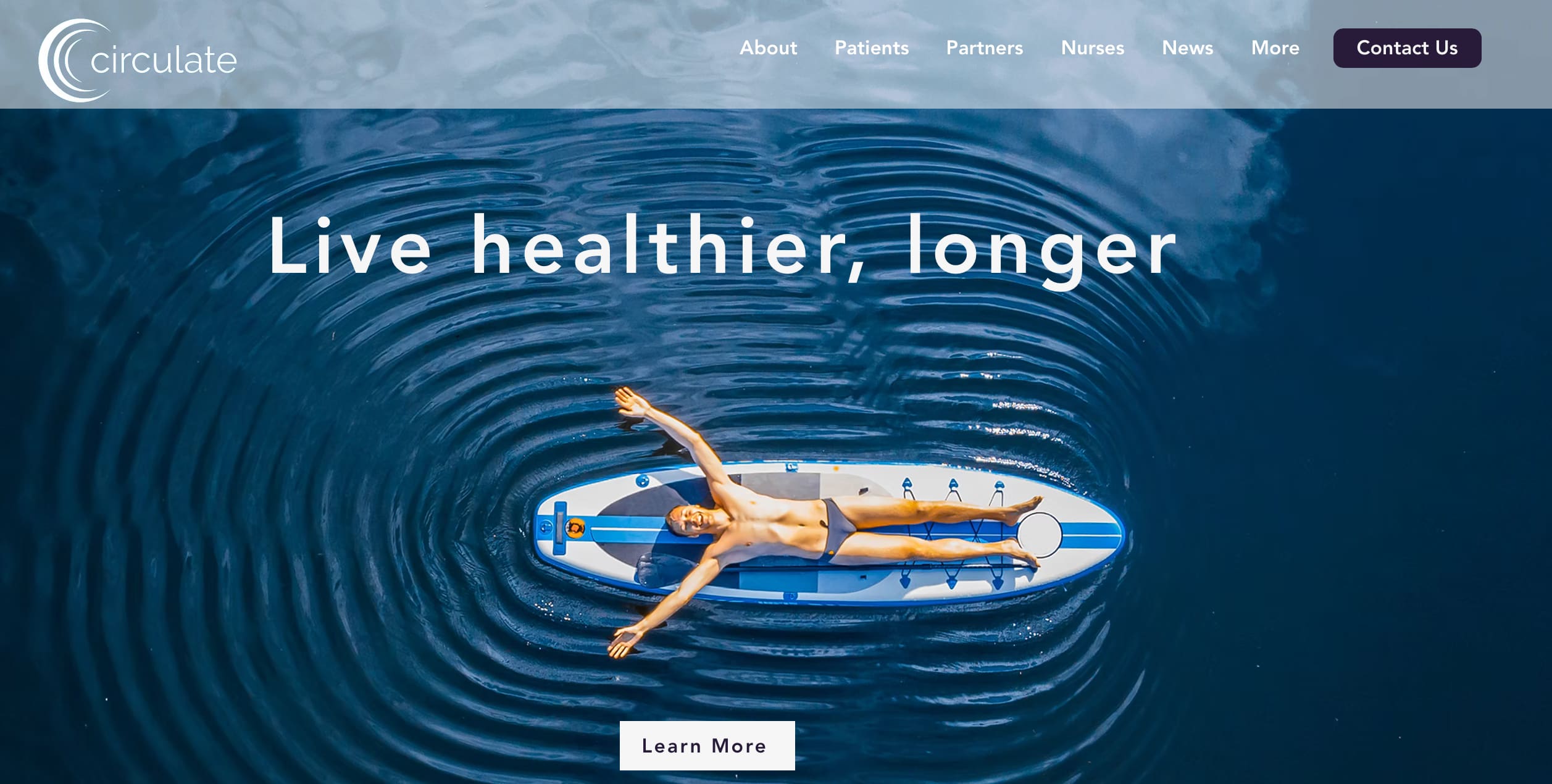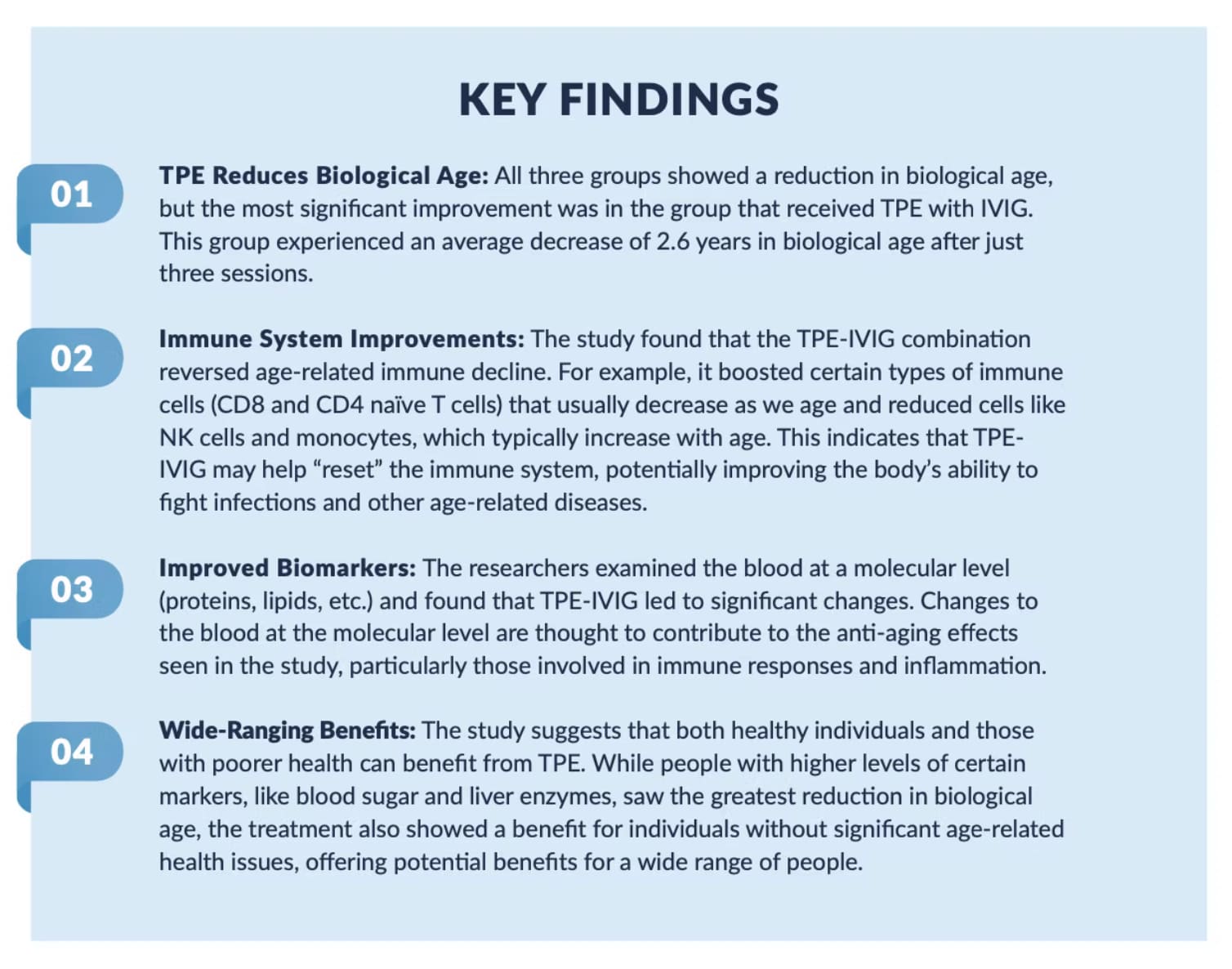Here is, what I believe is the final paper on this clinical study I participated in:
(Open Access)
Multi-Omics Analysis Reveals Biomarkers That Contribute to Biological Age Rejuvenation in Response to Single-Blinded Randomized Placebo-Controlled Therapeutic Plasma Exchange
We conducted a randomized, placebo-controlled trial to assess the safety and biological age (BA) effects of various therapeutic plasma exchange (TPE) regimens in healthy adults over 50. Participants received bi-weekly TPE with or without intravenous immunoglobulin (IVIG), monthly TPE, or placebo. Randomization was based on entry date, and treatments were blinded to maintain objectivity. Primary objectives were to assess long-term TPE safety and changes in biological clocks. Secondary goals included identifying optimal regimens. Exploratory analyses profiled baseline clinical features and longitudinal changes across the epigenome, proteome, metabolome, glycome, immune cytokines, iAge, and immune cell composition. We demonstrate in 42 individuals randomized to various treatment arms or placebo that long-term TPE was found to be safe, with only two adverse events requiring discontinuation and one related to IVIG. TPE significantly improved biological age markers, with 15 epigenetic clocks showing rejuvenation compared to placebo (FDR < 0.05). Biweekly TPE combined with intravenous immunoglobulin (TPE-IVIG) proved most effective, inducing coordinated cellular and molecular responses, reversing age-related immune decline, and modulating proteins linked to chronic inflammation. Integrative analysis identified baseline biomarkers predictive of positive outcomes, suggesting TPE-IVIG is particularly beneficial for individuals with poorer initial health status. This is the first multi-omics study to examine various TPE modalities to slow epigenetic biologic clocks, which demonstrate biological age rejuvenation and the molecular features associated with this rejuvenation.
https://onlinelibrary.wiley.com/doi/10.1111/acel.70103
and here are some excerpts from The NY Times article on the study:
Cars need oil changes to keep their engines running smoothly. Some anti-aging influencers, along with a handful of scientists, believe exchanging the plasma in your blood can do a similar thing for humans to help slow biological aging. The procedure is currently offered for thousands of dollars a session at many longevity clinics.
In a car, “you change the oil every 3,000 miles because it clears out debris," said Dr. Eric Verdin, the president and chief executive of the Buck Institute for Research on Aging. Your blood, he said, can also accumulate potentially damaging particles that can be flushed out.
One of the first trials examining plasma exchange for anti-aging in humans, published Tuesday in the journal Aging Cell, offers early evidence that it may be able to slow the biological breakdown that comes with age, even in otherwise healthy people. The small study of 42 participants, with an average age of 65, found that those who got plasma exchange therapy over the course of a few months had lower concentrations in their blood of the biological compounds that accumulate with age, compared with a control group. The trial was sponsored by Circulate Health, a plasma exchange startup, and coauthored by Dr. Verdin, a company co-founder and head of the scientific advisory board.
In the Circulate Health trial, one group of subjects received an albumin infusion every few weeks or so; another group got the same infusion plus an antibody to fight infections; and a control group got only saline. Researchers used dozens of biological age tests to measure subjects’ blood several times during the full three-to-six-month regimen. They estimated that the albumin and antibody group decreased their biological age by about 2.6 years, while those on the albumin regimen saw a roughly one-year reduction. People who received only saline generally saw their biological age increase over the course of the trial.
While the Circulate Health study is “intriguing,” and suggests that plasma exchange appears to affect subjects’ blood composition even after the procedure, it doesn’t necessarily mean that it will help people live longer or healthier, said Dr. Jeffrey Winters, the chair of transfusion medicine at the Mayo Clinic. He said the trial was too small to prove anti-aging benefits; it also didn’t follow subjects for more than a few months, so it’s not clear how long the effects of plasma exchange last.
In the study, the authors hypothesized that treatments could get less effective over time as the body adjusts to the infusions. (The subjects typically didn’t show much difference in biological age after the third measurement, compared with the control, suggesting that the impact of the therapy could level off.)
https://www.nytimes.com/2025/05/28/well/plasma-exchange-longevity.html



